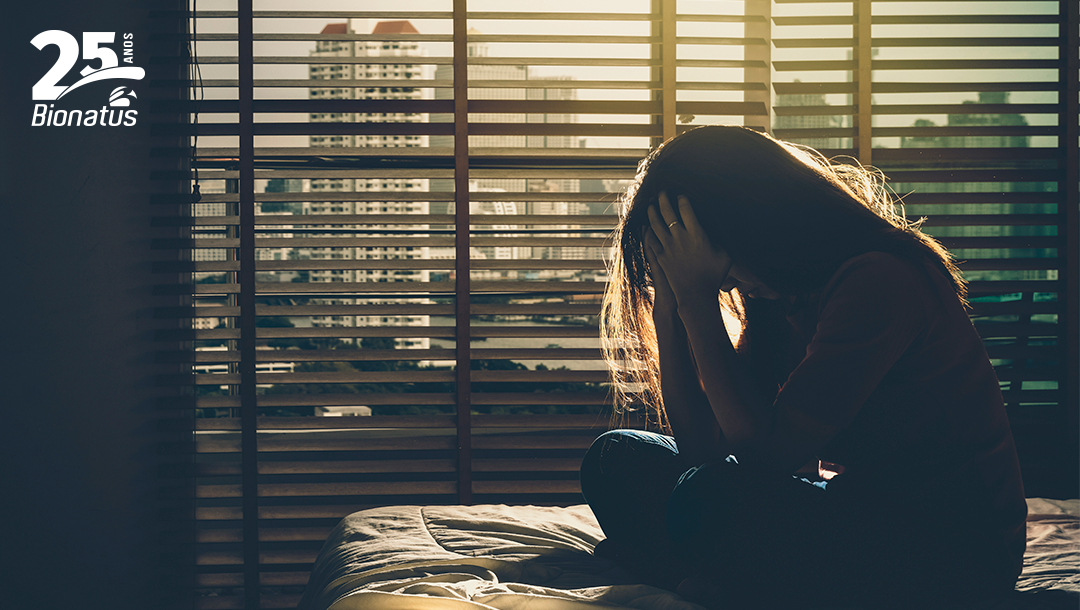
Depression: A Silent Disease
10 setembro 2018
Depression affects more than 300 million people worldwide, but its symptoms are not always easily identified.
Depression is characterized as a disease in which chemical imbalances of neurotransmitters occur. These substances are responsible for transporting information through the neural network of our brain - including the sensations of pleasure, serenity, mood and well-being.
Depression affects neurotransmitters such as serotonin, dopamine, norepinephrine, and melatonin, which interfere precisely with these feelings. This chemical imbalance can trigger a series of responses in various functions of the body. The consequences are symptoms such as deep sadness; loss of general interest; apathy; difficulty concentrating; pessimism; insecurity; loss of appetite; absence of pleasure and mood swings, which can culminate in suicidal thoughts.
In addition to the well-known psychological symptoms, there is a group of depression symptoms that interfere with our physical health. If not treated, the health condition worsens, causing signs that are not always related to the disease. Among the physical sensations that can accompany depression are digestive problems; headaches; sleep disorders; tension in the neck and shoulders; tiredness or fatigue; changes in appetite; changes in weight; pain in the body and low immunity.
According to the World Health Organization (WHO), depression affects more than 300 million people of all ages in the world. Depression is a disease that can have three stages: mild, moderate and severe. At all levels it is essential to seek specialized treatment with psychologists and psychiatrists. The medical follow-up is essential to prescribe if the use of medicines is necessary and which substances are appropriate for each case. On the other hand, psychological monitoring is important so that the patient can talk about what he or she is feeling and also learn how to deal with depression in his or her daily life.
In cases of mild to moderate depression, there is the option of treatment with the drug Hyperativ, because it is a herbal medicine, does not cause dependence. In addition to relieving the symptoms of depression, Hyperativ also decreases the associated symptoms such as anxiety, tension, and muscle pain.
Often, a person who has depression cannot ask for help, so it is necessary for family and friends to observe the changes in behavior in people they meet and take the initiative to talk to and offer help. Depression in severe cases can lead to suicide. It is important to be aware of the signs and seek help.
Symptoms of Depression:
Depressive mood or irritability, anxiety and distress;
Discouragement, easy fatigue, need for more effort to do things;
Decrease or inability to feel joy and pleasure in activities previously considered pleasant;
Lack of interest and apathy;
Lack of will and indecision;
Feelings of fear, insecurity, hopelessness, despair, helplessness and emptiness;
Pessimism, frequent and disproportionate ideas of guilt, low self-esteem and feeling of lack of meaning in life;
A person may wish to die, plan a way to die, or attempt suicide;
Distorted and negative interpretation of reality;
Difficulty concentrating, slower thinking and forgetfulness;
Decreased sexual performance (may even maintain sexual activity, but without the usual pleasurable connotation) and libido;
Loss or increase of appetite and weight;
Insomnia (difficulty in reconciling sleep, multiple awakenings or very superficial sensation of sleep), early morning awakening (usually two hours before the usual time) or, less frequently, increased sleep (sleeps too much and still gets sleep most of the time);
Pains and other physical symptoms not justified by medical problems, such as belly pain, poor digestion, heartburn, diarrhea, constipation, flatulence, tension in the neck and shoulders, headache or body pain, heavy body sensation or pressure in the chest, among others.
Source
https://www.minhavida.com.br